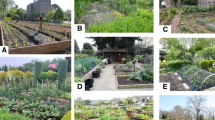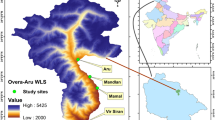Abstract
Waste management in developing world urban areas is an acute problem which is linked to high growth rates and abatement methods less advanced than in the developed world. Existing neighborhood waste management practices often include the use of organic waste as a feed supplement for urban livestock (mainly goats, but also sheep and cattle). These urban animals bring economic benefits to less affluent residents, who would suffer an economic loss if their supply of urban waste was reduced or eliminated by an organized waste collection and disposal strategy. This paper employs a survey of 319 Greater Khartoum households to derive an estimate of waste intake per urban animal, and illustrate demographic factors (e.g., rural or urban roots, income, education, number of children) which influence animal keeping. A loglinear/logit model is developed to predict animal-keeping households. This model can be applied by waste management planners to estimate the frequency of urban animals in developing world urban areas.
Similar content being viewed by others
References
Attahi, K. (1989). Cote d'Ivoir: An evaluation of urban management reforms. In Stren, R. E., and White, R. R. (eds.),African Cites in Crisis. Westview Press, London.
Awad, M. H. (ed.) (1984).Socio-Economic Change in the Sudan: Monograph 6. Graduate College Publications, University of Khartoum.
Bammeke, A. O., and Sridhar, M. K. C. (1989). Market waste in Ibaden, Nigeria.Waste Management and Research 7: 115–120.
Best, J. (1987). Homestead livestock and household livelihood in Sarawak: Innovations versus improvements.Community Development Journal 22(3): 197–201.
Burn, S. M. (1991). Social psychology and the stimulation of recycling behaviors.Journal of Applied Psychology 21(8): 611–629.
El Sammani, M. O., El Hadi Abu Sin, M., Talha, M., El Hassan, B. M., and Haywood, I. (1989). Management problems of Greater Khartoum. In Stren, R. E., and White, R. R. (eds.),African Cities in Crisis. Westview Press, London.
Feuerstein, M. T., Shaw, A., and Lovel, H. (1987). Editorial introduction: The role of livestock in community development.Community Development Journal 22(3): 175–188.
Freeman, D. B. (1991).A City of Farmers: Informal Urban Agriculture in the Open Spaces of Nairobi. Kenya, McGill-Queens University Press, Montreal.
Lee-Smith, D., and Syagga, P. (1989). Access by the Urban Poor to Basic Infrastructure Services. African Region Paper for EDI, Washington, D.C.
Oskamp, S., Harrington, M. J., Edwards, T. C., Sherwood, D. L., Okuda, S. M., and Swanson, D. C. (1991). Factors influencing household recycling behavior.Environment and Behavior 23(4): 494–519.
Population and Housing Survey 1964/65. The Republic of the Sudan Department of Statistics, November 1965.
Rakodi, C. (1988). Urban agriculture: Research questions and Zambian evidence.The Journal of Modern African Studies 26(3): 495–515.
Rushbrook, P. E., and Finnecy, E. E. (1988). Planning for future waste management operations in developing countries.Waste Management and Research 6(1): 1–21.
Stren, R. E., and White, R. R. (eds.) (1989).African Cities in Crisis. Westview Press, London.
Tripp, A. M. (1988). Women and the changing urban household economy in Tanzania.Journal of Modern African Studies 26(4): 601–623.
Vining, J., and Ebreo, A. (1990). What makes a recycler? A comparison of recyclers and nonrecyclers.Environment and Behavior 22(1): 55–73.
Wekewete, K. H. (1992). Africa. In Stren, R., White, R., and Whitney, J. (eds.),Sustainable Cities: Urbanization and the Environment in International Perspective. Westview Press, Boulder, Colorado.
Whitfield, L. (1987). City farms: Livestock in urban communities.Community Development Journal 22(3): 242–245.
Whitney, J. B. R. (1990). Goats and Garbage in Khartoum Sudan. Paper presented at the Annual Meeting of the American Association of Geographers, June.
Wrigley, N. (1985).Categorical Data Analysis for Geographers and Environmental Scientists. Longman, London.
Yhdego, M. (1988). Urban solid waste management in Tanzania.Waste Management and Research 6(3): 175–194.
Yhdego, M. (1992). Storage, collection and disposal of Kariakoo market wastes in Dar Es Salam, Tanzania.Waste Management and Research 10(2): 131–140.
Author information
Authors and Affiliations
Rights and permissions
About this article
Cite this article
Richardson, G.M., Whitney, J.B.R. Goats and garbage in Khartoum, Sudan: A study of the urban ecology of animal keeping. Hum Ecol 23, 455–475 (1995). https://doi.org/10.1007/BF01190132
Issue Date:
DOI: https://doi.org/10.1007/BF01190132




